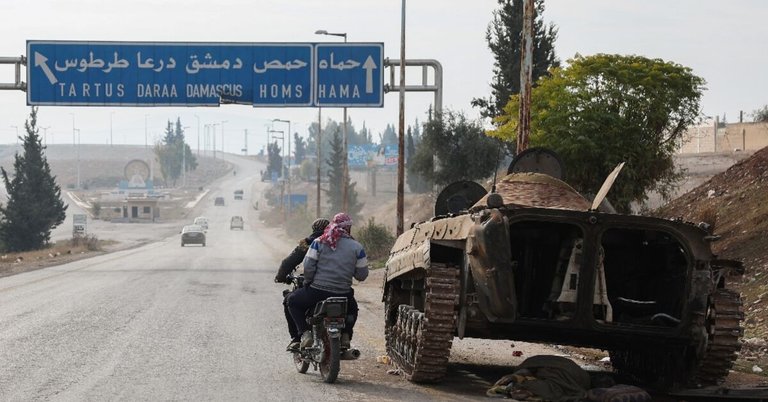 Source
SourceSyrian rebel leader Abu Mohammed al-Golani is in prime-time mode, following the stunning victory of his group-led offensive over the regime of Bashar al-Assad, which seems to have come to an end according to the first reports coming out. The (former?) President left Damascus by plane before the storming entry of the rebels. In late November the Islamist rebels began an electric march towards Damascus, first taking the critical city of Aleppo. Hama and Homs would follow. In a sign that the power of the deposed ruler was sustained on false piles, the resistance was little and many instead desertions in his security forces, attending to the rebels' commitment that they were not seeking bloody revenge but to topple the Baath rule, protected mainly by Iran and Russia. Forces loyal to the government would only control about 14% of the provincial capitals, including one, Tartus, which hosts a major Russian base and has been the main source of support for al-Assad. In a region racked by conflict, the abrupt, lightning end to the latter opens up new questions about its immediate future.
The composition of the Syrian opposition is a controversial mix of groups—Hayat Tahrir al-Sham, the main one, once linked to al-Qaeda, and others backed by Turkey or the United States—which have at times been at odds with each other. It is unclear how they will relate to each other after their military success, with some concerns arising about their Islamist character, both outside and inside Syria. Meanwhile, Mohammed al-Golani has ordered his men to respect the state institutions, and even not to fire shots in the air. So, the prime minister will remain in charge of government business until further notice. Operations at Damascus airport are reported to be halted. Many stores were closed yesterday, Saturday, but in those open prices were three times higher. “My feelings are indescribable,” a young lawyer celebrating al-Assad's defeat Sunday told AP. “After the fear that he and his father made us live in for many years, and the panic and state of terror that I was living in, I can't believe it.” The al-Assad family had ruled the country for the past 50 years.
 Source
Source

The Druze in the Golan and to the east have also been active in the conquest of Syria. It is clear they are proxies for the IDF, which is reported to be directly retaking a buffer zone between occupied Golan and Syria it ceded to the UN, with Merkava tanks entering that region largely inhabited by Druze. I have been able to piece together a picture of the control of Syrian ground by USA proxies Kurdish Islamic Communist YPG in the east, bordering Iraq and Turkey and stretching to the Euphrates, Turkish proxies HTS from the Turkish border north of Idlib to Damascus, from the Euphrates to the east and the mountains bordering Latakia to the west, US proxies SDF from the Jordanian and Iraqi southern border into the uninhabited desert between Damascus to Palmyra, Israeli proxies comprising Druze and tribal forces in the Golan and the southwest border with Israel, Lebanon, and Jordan, and a wide variety of tribal and mercenary forces of a bewildering array of Islamic groups ranging from extremist Jihadi/Salafist beliefs to kinder, gentler terrorists long trained and supplied by CIA/Mossad since George HW Bush was Director of the CIA under President Jimmy Carter when al Qaeda was born.
Reports that summary execution of Bashar Assad's nephew and ethnic cleansing of religious minorities, particularly Christians, is well underway, have emerged but remain unverified, contribute to the confusion and terror that is the standard operating procedure of the foggy warriors in the field and heat of military conquest. The sotto voce rumors that Assad had resorted to narcotyranny and sustained the Syrian state by manufacturing and distributing captagon, a stimulant popular in the ME, are presently unconfirmed and what that bodes for the present warlords' principalities unknown. The several narratives regarding the disposition of Assad himself are also open ended presently, with him and his family having moved camp to Moscow a week ago, him returning to Damascus and taking flight just as belligerents reached the gates of the capitol city but going down somewhere south of Homs, or continuing on escorted by Russian fighters to Latakia and beyond, and his whereabouts or survival remain unknown.
Latakia seems to have been spared conquest, and the Russian naval bases there yet unmolested, although reports of proxy forces in the mountains are emerging. Latakia is the ancestral home of Assad and the Alawites, and some negotiation between Putin and Erdogan recently may have enabled the Alawite region and Russian bases to remain independent, if Turkish protectorates.
None of this can be confirmed by me, and the veracity of any of these narratives will emerge as the fog of war lifts and the situation on the ground becomes clearly observable.
Thanks!
afghanistan 2.0 incoming